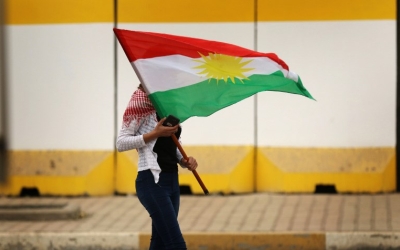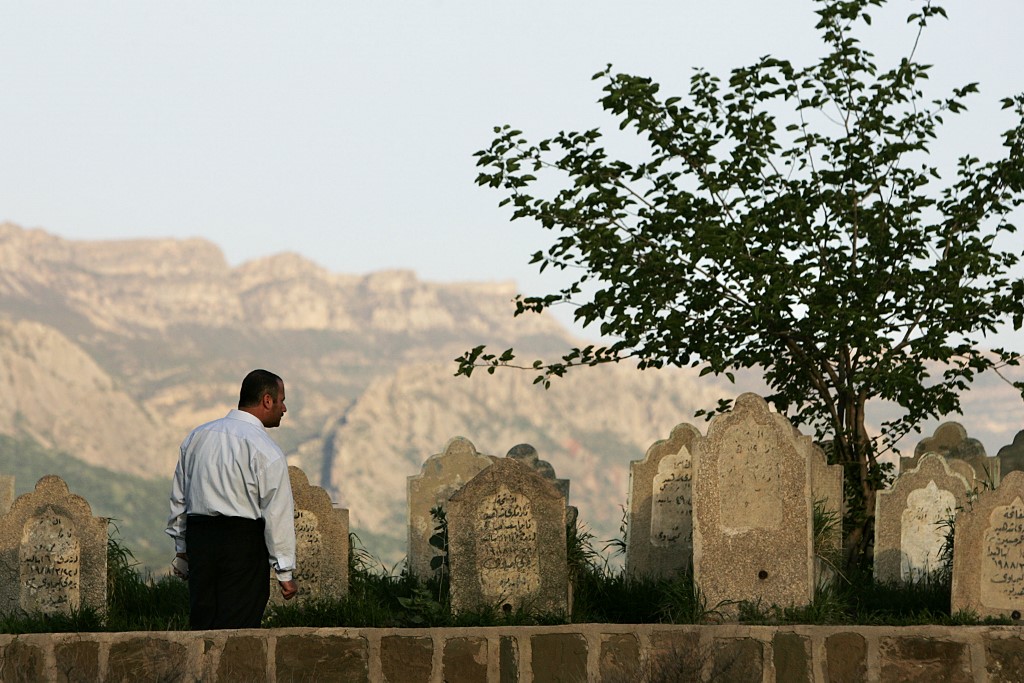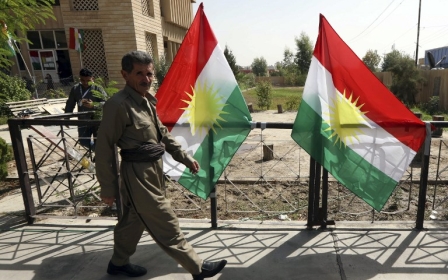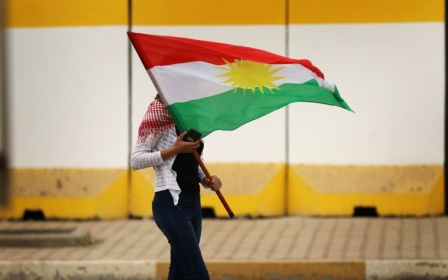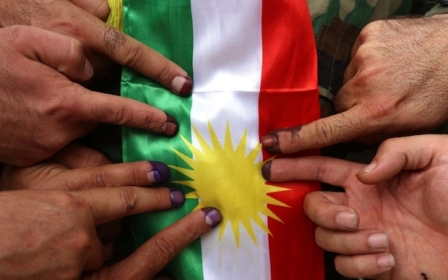Anfal: A dark chapter of Kurdish history haunts survivors
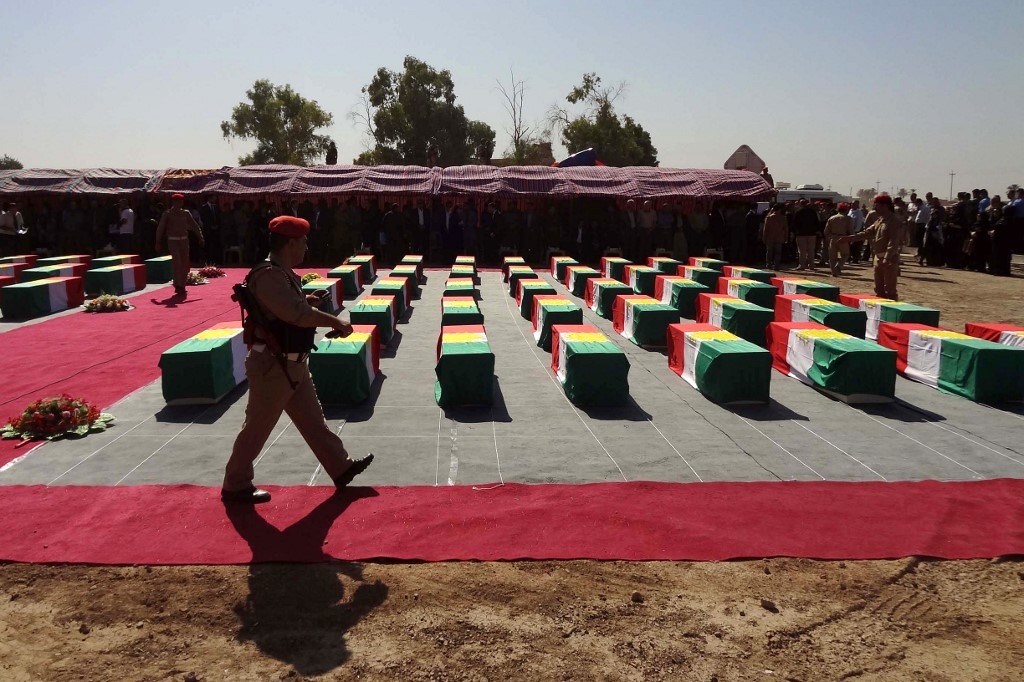
Taban Shoresh was just four years old when Iraqi intelligence officers appeared at her grandparents’ home in Erbil and dragged her mother off for questioning.
They took her and her grandparents to prison. Shoresh vaguely remembers the stench of the dank cell, where she was held alongside other families with young children.
“When you have the image of the prison you were in as a child, and flashbacks of what no child should experience, and near-death experiences, it makes me stop every year and think: Did that really happen to us?” she told Middle East Eye.
International recognition
It has been 31 years since that fateful day, and this darkest of chapters in contemporary Kurdish history continues to haunt survivors of all ages. But the campaign waged by Saddam Hussein’s Baathist government to exterminate Iraq’s Kurdish population – called Anfal – has yet to be recognised universally as a genocide.
New MEE newsletter: Jerusalem Dispatch
Sign up to get the latest insights and analysis on Israel-Palestine, alongside Turkey Unpacked and other MEE newsletters
Bayan Sami Abdul Rahman, the Kurdistan Regional Government (KRG) Representative to the United States who has played a key role in lobbying for recognition, told MEE: "talking about genocide and advocating for genocide recognition is difficult. For one, the public space today is flooded with numerous crises and major news stories, so it is difficult for events that happened 30 or 40 years ago to get proper hearings."
Like other communities that have survived genocide, the Kurds long for international recognition and a true reconciliation process. But the issue has been complicated by politics, a state of endless war since 2003,
as Rahman notes, "genocide recognitions can have actual consequences in terms of justice, reparations, and financial liabilities. Since many of the companies that provide weapons and chemicals to regimes like that of Saddam Hussein are Western, these recognitions can have consequences even outside of Iraq."
The official day of remembrance is marked on 14 April across Kurdish areas, but for many, this is insufficient; they say it should be included in school curriculums in Iraq.
'I remember all the thousands of people who didn't survive, those tortured, killed, and buried alive – but why isn't this taught in schools?'
“Yes, we have a remembrance day – and for me, I remember all the people who didn't survive. I remember all the thousands of people who didn't survive, those tortured, killed, and buried alive – but why isn’t this taught in schools?” Shoresh lamented.
Anfal was the culmination of a longstanding policy of Arabisation in areas now referred to as “disputed territories” in Iraq. The areas spread over an oil-rich belt that straddles the borders of Arab Iraq and Kurdish Iraq.
Arabisation began in earnest in the 1960s under the Baath regime, which systemically moved Kurdish farmers off their lands and resettled nomadic Sunni tribes in their place. Thousands of Kurdish villages were destroyed, and the policy of displacement continued right up until the fall of Saddam.
Spoils of war
In February 1988, after meticulous planning, Saddam entrusted his cousin, Ali Hassan al-Majid, then secretary general of the Baath party’s northern bureau, to carry out a systematic programme of destruction in Iraq’s Kurdish areas. Named after Sura 8 in the Quran, the Anfal campaign viewed the Kurds, much as the Islamic State (IS) viewed the Yazidis, as legitimate spoils of war.
The exact number of people who perished during those eight fatal months between February and September 1988 is unknown, but the most widely cited figures are between 100,000 and 180,000. Some contest that this was even a genocide, but Iraq itself recognised it as such in 2007, convicting Majid and his cohorts of committing genocide against the Kurds. Saddam was hung for other crimes before his trial for genocide was completed.
For survivors, this contestation and lack of international recognition is problematic. Despite the challenges the KRG have had some success four parliaments Norway, Sweden, the UK and South Korea, recognising the genocide.
Aside from Iraq, only four parliaments (Norway, Sweden, the UK and South Korea) have recognised it as such.
Shoresh, now 36 and founder of the non-profit Lotus Flower organisation, managed to escape her imprisonment during the Anfal campaign and says the experience shaped her as a person.
“My personal childhood experience of surviving the genocide has completely shaped the work I do now. I founded The Lotus Flower to support women and girls impacted by conflict and displacement after ISIS attacked the Kurdistan region of Iraq. I couldn’t believe that in my lifetime, still in my early thirties, I survived one genocide and witnessed another one,” she said.
“A lot of people I speak to, when I tell my story, don't know that there was the Anfal genocide. This is sad, and as a survivor you feel let down, especially by the international organisations and community.”
Fact-finding mission
The lack of greater awareness is unfortunate, but it is not surprising. The events took place against the backdrop of the Iran-Iraq war, which for years allowed the Iraqi government to pin the blame for many of the more brutal instances, such as the chemical attack on Halabja, on Tehran.
As such, few Western governments saw any advantage in acknowledging that their then-ally Saddam was butchering thousands of civilians and razing their villages to the ground. Indeed, Majid proclaimed the fact himself: “Who’s going to say anything? The international community? F*** them!”
Shorsh Haji, who was part of the Peshmerga at the time, survived a chemical attack in the first phase of Anfal. Later, he was among the first to document the scale of the campaign.
“I knew what the true scope of the Anfal was, yet once we had reached the safety of refugee camps in Iran, I was extremely surprised to find there was little-to-no international or Western reaction to what had happened,” Haji told MEE.
“I asked a friend why that was, and he said because we need to give them facts, numbers, proof. So I set about gathering information from other survivors in the camps,” he recalled. “I gathered the names of 3,800 villages that had been destroyed and 32,000 people who, at that point, were known to have died in the gassings.”
The thorny issue of reconciliation
Haji’s work was published in Arabic by one of the two major Kurdish political parties, the Patriotic Union of Kurdistan (PUK), and came to the attention of Human Rights Watch after the 1991 uprising. They asked Haji to work with them on the cache of documents looted from the Baath party, which confirmed the meticulous planning of the campaign.
In the 1990s, it was still difficult to extensively document and publicise the genocide, but after the fall of Saddam in 2003, the Kurdistan Regional Government was in a position to start creating a national archive of Kurdish history, and in particular, the genocide. British journalist Gwynne Roberts has been commissioned to help create a film archive of Kurdish history, which will one day be showcased in a national museum designed by Daniel Libeskind.
'Looking back, I don't think there was any support for me as a survivor. It feels like we went through it and were left alone'
“Over the past 10 years, we have painstakingly researched modern Kurdish history, visited every corner of Kurdistan and spoken to people of every strata of Kurdish society,” Roberts, international director of the Kurdistan Memory Programme, told MEE. “We have collected a treasure trove of testimony from Kurds who experienced tragic historical events at first hand and [were] deeply traumatised in the process.”
The thorniest issue, however, remains that of reconciliation. During the Anfal campaign, some Kurdish tribes collaborated with the Baathists and helped them carry out atrocities. In 1991, as the uprising occurred, the Kurdistan Front, a coalition of parties, issued an amnesty to all collaborators.
“One of the best decisions they made was to declare an amnesty. It wasn’t just that the Peshmerga would have been outnumbered, but to stop the people and Peshmerga [from] committing revenge killings on the collaborators and, in turn, further killings to avenge those,” Haji said.
Yet, this means that high-ranking collaborators still walk freely in Iraq’s Kurdish region today. “The one issue with the amnesty was its wording: It didn’t make any allowances to prosecute in the future those who had played actively criminal roles and killed hundreds,” Haji said.
‘True remembrance’
Shoresh admits that the lack of formal reconciliation has been difficult. “Looking back, I don't think there was any support for me as a survivor,” she said. “It feels like we went through it and were left alone. For me, reconciliation has been a personal journey. I’ve had to reconcile what’s happened personally within myself, to forgive and be at peace, for my own sanity.”
In the coming weeks, numerous remembrance ceremonies will be held across the Kurdish region of Iraq and in cities in Europe with sizeable Kurdish communities. Kurdish channels will air interviews with survivors and show harrowing footage of the destruction of villages.
But Haji questions whether now, 31 years on, this is the best way to remember the genocide.
“This part of our history is not taught in schools, but it should be. The youth must learn how and why it happened,” he said. “Teaching them their history, that is true remembrance.”
Shoresh echoes these sentiments. Education is key, she said, adding: “Being a survivor has made me more determined to help other victims of genocide so they don’t experience what I experienced and sit 31 years later, still with nothing, no justice, no recognition and forgotten – not by Kurds, but by others.’
The views expressed in this article belong to the author and do not necessarily reflect the editorial policy of Middle East Eye.
Middle East Eye delivers independent and unrivalled coverage and analysis of the Middle East, North Africa and beyond. To learn more about republishing this content and the associated fees, please fill out this form. More about MEE can be found here.



